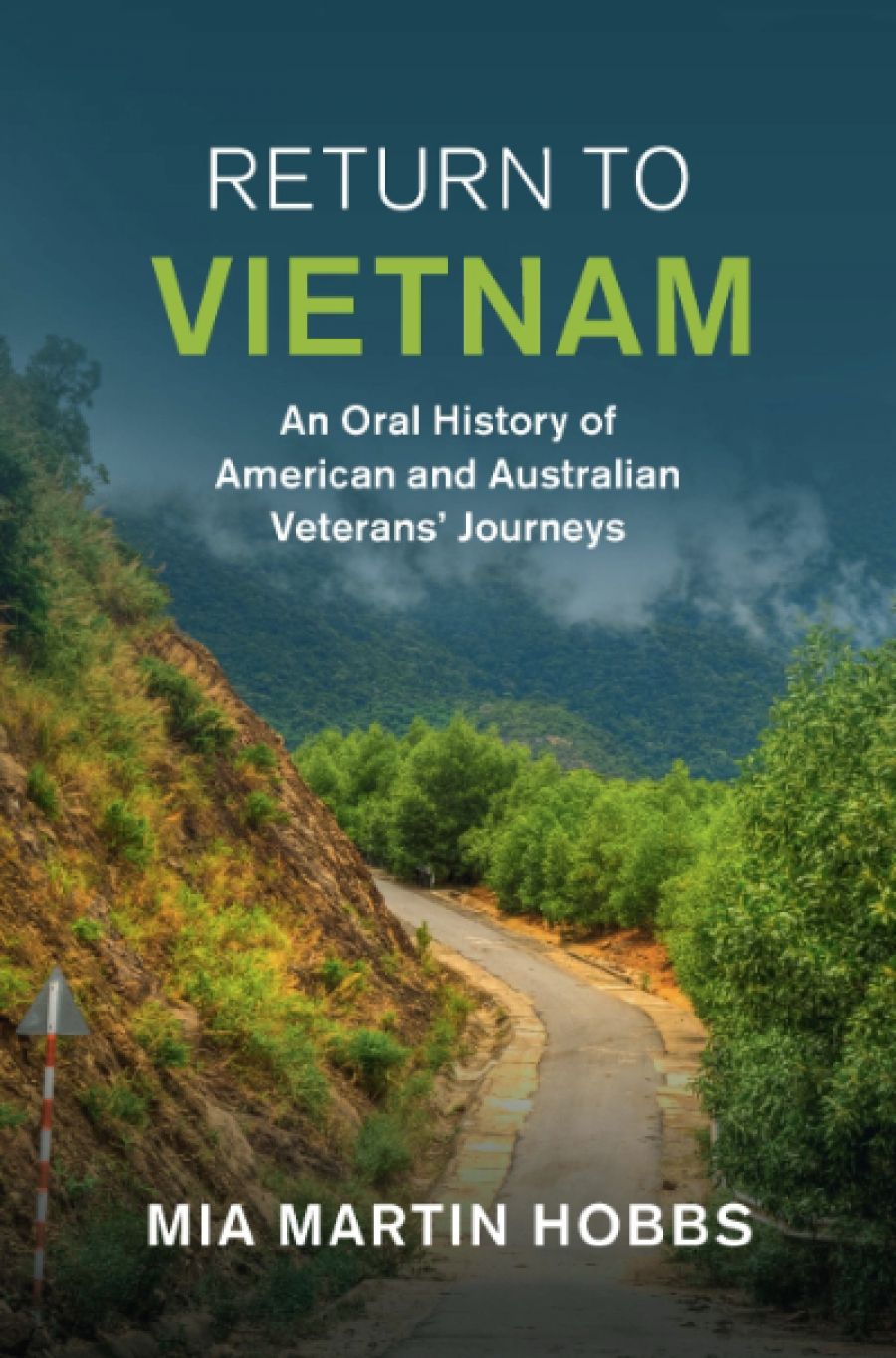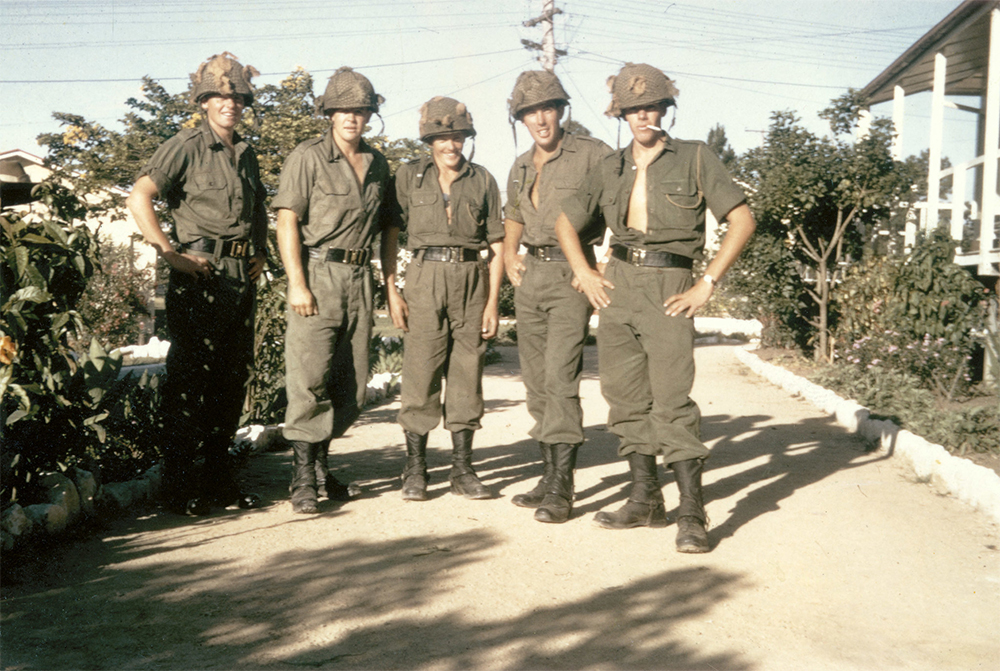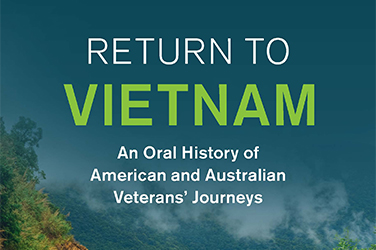
- Free Article: No
- Contents Category: Military History
- Review Article: Yes
- Article Title: From Vietnam to Việt Nam
- Article Subtitle: Conscripting memory of a divisive conflict
- Online Only: No
- Custom Highlight Text:
Australia’s Vietnam War has passed through several phases in the last six decades. In the mid-1960s the commitment of combat forces by the Menzies and Holt governments was strongly supported. The war and the associated conscription scheme became the focus of enormous controversy in the late 1960s and early 1970s, contributing to Labor’s electoral success in 1972. Gough Whitlam did not pull out the troops – that had already been done by his predecessor, William McMahon – but he did recognise the communist government in the north, even before the war was over.
- Article Hero Image (920px wide):

- Article Hero Image Caption: Members of 8 platoon, C Company, 6th Battalion, Royal Australian Regiment, in the battalion lines at Enoggera, Queensland, prior to deployment to Vietnam in May 1966 (photographer unknown, via Australian War Memorial)
- Featured Image (400px * 250px):

- Alt Tag (Featured Image): Peter Edwards reviews 'Return to Vietnam: An oral history of American and Australian veterans’ journeys' by Mia Martin Hobbs
- Book 1 Title: Return to Vietnam
- Book 1 Subtitle: An oral history of American and Australian veterans’ journeys
- Book 1 Biblio: Cambridge University Press, $141.95 hb, 288 pp
- Book 1 Readings Link: booktopia.kh4ffx.net/Zdexx1
The postwar debate in the United States was far more intense and lasted far longer, despite President Ronald Reagan’s declaration that the war had been a ‘noble cause’ and President George H.W. Bush’s assertion that America had ‘kicked the Vietnam syndrome’. Veterans, whose views on the war ranged from profound opposition to staunch support, were major contributors to bitter debates over what many regarded as the country’s first defeat. The stream of books on America’s war in Vietnam included memoirs by veterans, the predominant tone being highly critical.
Today, Australia’s Vietnam War most commonly appears in public discourse bracketed with the conflicts in Iraq and Afghanistan, as painful and unsuccessful military ventures in which Australia participated primarily, if not solely, as the premium on our strategic insurance policy with the United States. As our current leaders double down on the US alliance, adding the new AUKUS agreement to the seventy-year-old ANZUS treaty, their critics point to the Vietnam War as a classic example of the disasters to which that might lead. That argument seems to have gained little traction partly because, beneath the obvious parallels, the Australian and American experiences of the war – its aftermath, its legacies, its memories – were not identical.
That is but one of the insights into current affairs to be gained from what might seem an unreliable source: an oral history of American and Australian veterans who returned to Vietnam. Mia Martin Hobbs has examined, mostly through personal interviews, the testimony of forty-three American and twenty-six Australian veterans, exploring their motives for enlisting, their reactions to the experience, their reflections on the politics of the war, including the anti-war movement, and their thoughts about the country to which they returned.
Much of the book is about how the veterans resolve the tensions between the country in which they fought and the country to which they returned. The contrast is neatly underlined by Martin Hobbs, who uses Western script for the former and Vietnamese script for the latter. Thus, for example, the Australian veterans’ recollections of Vietnam include the Battle of Long Tan, the task force base at the place they knew as Nui Dat, and the logistic base at Vung Tau; but they return to Việt Nam, attempt (successfully or otherwise) to conduct commemoration ceremonies at Long Tân, visit or even settle in Vũng Tàu, and perhaps learn that núi đất simply means ‘dirt hill’.
Recording and analysing the words of veterans much older than her, Martin Hobbs writes more like a counsellor than someone pressing a political, social, or historical argument. She is both compassionate and dispassionate: compassionate in the sense that she does not question the physical or psychic trauma suffered by the veterans, whatever their views or attitudes, but dispassionate in analysing the views they express and how they attempt to settle their ‘ghosts’ and ‘demons’. Martin Hobbs points out that some claims or assertions are historically inaccurate or simply unfounded. Rather than denouncing or disparaging, she proceeds to interpret and comprehend the assertions sympathetically, as evidence of individuals trying to reconcile their personal memories of Vietnam with their experience in Việt Nam.
To carry this off requires knowledge not only of the military and political history of the war and its memorialisation in all three countries, but also of relevant works in sociology, psychology, and psychiatry. There are succinct but apposite references to such varied and potentially dangerous topics as Agent Orange, PTSD, the Anzac Revival, Orientalism (and its obverse, radical Orientalism), and the differing Australian and American traditions of battlefield pilgrimages. The book began as a PhD thesis, and one can hardly imagine a topic in which a candidate has had to tread more carefully through so many (if the phrase may be forgiven) academic minefields. The writing is dense, as Martin Hobbs protects herself with scholarship, at times providing a footnote to every sentence.
One of Martin Hobbs’s academic mentors was the leading oral historian Alistair Thomson, whose book Anzac Memories (first published 1994, new edition 2013) pioneered the serious study of veterans’ memories. Australia’s Vietnam War veterans often expressed the wish to be incorporated into the Anzac tradition, from which they felt for some time excluded by the controversies surrounding the war. This book integrates them into the tradition of Anzac memories.
The analysis is both chronological and thematic. Martin Hobbs divides the returns into three periods: Reconciliation (1981–94), Normalization (1995–2005), and Commemoration (2006–16). The first was dominated by American anti-war veterans seeking forgiveness for their involvement in a war that they had thought was profoundly wrong. The second includes the period when the United States and Việt Nam normalised their diplomatic relations, but the concept of normalisation applies to individuals as well as governments. The Australians predominate in the Commemoration period. The book’s conclusion is centred on two events in 2016, one of which was the controversy surrounding the attempt by about a thousand Australian veterans to commemorate the fiftieth anniversary of the Battle of Long Tan.
The thematic chapters refer to the ‘Relics and Remnants’ of the war encountered by the returning veterans, everything from Zippo lighters and dog tags to the Amerasian children fathered by American veterans; the experience of meeting those who fought, or experienced the war, from ‘the other side’ in ‘Meeting the Enemy’; and the returnees’ emotional responses to four principal places of commemoration: the War Remnants Museum in Hồ Chí Minh City; the Hóa Lò Prison Museum in Hà Nội (the ‘Hanoi Hilton’); the Son Mỹ Memorial (to the My Lai atrocity); and Long Tân.
Drawing broad conclusions from a small number of oral interviews is problematic, but Mia Martin Hobbs’s careful presentation and wide-ranging scholarship give many insights into the war’s aftermath, the differences between Australian and American experiences and attitudes, the risks and rewards of oral history, the construction of memory, and much else. Scholars in many fields will welcome this work, and its insights should be conveyed to wider audiences, not least veterans and those concerned for their welfare.


Comments powered by CComment